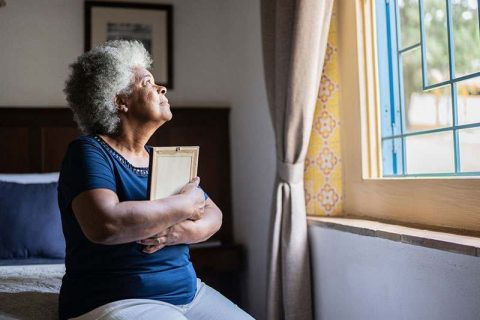January 16, 2024 by

When we reach our senior years, we have spent decades investing in relationships with family and friends. These bonds are crucial to our quality of life, and when they are severed, it inevitably leads to feelings of deep loss.
It can be an overwhelming experience to help an aging loved one through grief, but there are steps you can take. It begins with understanding more about this profound emotion.
What Do You Need to Know About Grief in Seniors?
Grief Is Complicated.
- Grief in seniors is a complex emotional response to various losses, including the passing of loved ones, declining health, or changes in independence.
- Recognizing the unique nature of each senior’s grieving process is crucial for providing personalized support.
Grief Is a Process.
- The grieving process is non-linear and unique to each individual, encompassing stages such as denial, anger, bargaining, depression, and acceptance.
- Seniors may revisit these stages at different times, requiring patience and empathy from caregivers and loved ones.
Grief Takes a Toll on Mental Health.
- Grief shows up in many ways, impacting mental health and well-being.
- Seniors may experience feelings of sadness, loneliness, and even physical symptoms such as changes in appetite or sleep patterns.
How Can You Help Someone Who Is Grieving?
Reach Out to A Professional. Grief is a complex emotional experience, and professional support can provide valuable guidance. Encourage the person to explore counseling or join a support group tailored to their needs. Professional resources offer coping strategies, tools for managing emotions, and the comfort of a supportive community, aiding in the healing process.
Keep Communication Channels Open. Grieving seniors often face the struggle of expressing their emotions. Encourage open communication, providing a safe space for them to share their feelings. Be a compassionate listener, offering reassurance and understanding without judgment. Creating an environment where emotions can be expressed fosters a sense of connection and healing.
Reach Out to Your Support System. Building a supportive community is crucial for someone facing grief. Create opportunities for social interactions, and ensure they maintain connections with friends, family, and community resources. Establishing a network of support can provide a sense of belonging, reducing feelings of isolation and fostering a supportive environment for healing.
Find Constructive Coping Mechanisms. Engaging in activities that bring joy and comfort is essential for coping with grief. Encourage the individual to pursue hobbies, participate in social interactions, and practice mindfulness. Additionally, emphasizing a healthy lifestyle, including regular exercise and nutritious meals, contributes to their overall well-being and resilience during challenging times.
We can help older adults work through grief. Our kind, compassionate care professionals provide both a listening ear and engaging activities to make each day a little brighter. Contact us online or at (315) 579-HOME (4663) for assistance and support in Syracuse, Camillus, Clay, or the surrounding areas.
